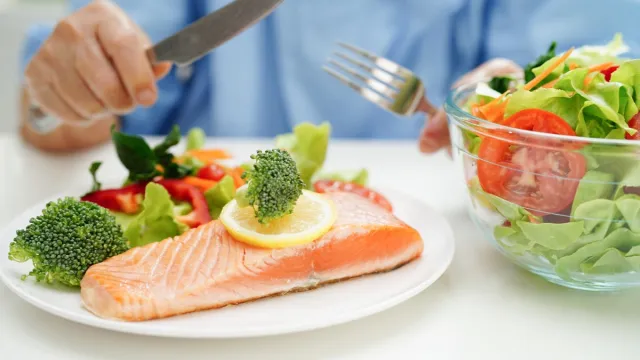43-Year-Old Doctor Who Lost 80 Pounds Shares Her Weight-Loss Diet

Losing weight and keeping it off isn’t easy, even for medical professionals. Betsy Grunch, MD, a board-certified neurosurgeon based near Atlanta, recently spoke to Business Insider about her long-term struggle with weight loss after not receiving a lot of nutritional education in her medical training. By educating herself, however, the doctor was eventually able to lose 80 pounds. She did this largely by changing what she ate, and honing in on a weight-loss diet that actually works.
RELATED: Lose 50 Pounds by Following 2 Simple Rules, Successful Dieter Says.
In addition to being a busy neurosurgeon, Grunch is also a mother of two, so it can be a challenge for her to find the time to prepare nutritious food, she told Business Insider. Before her weight loss, she would usually rely on the fast food she could grab at her hospital.
Grunch said she was consuming a lot of calories through her drinks as well, as she would regularly drink three or four sugar-filled sodas and sweet coffee drinks such as Frappuccinos every day.
“I didn’t realize what the cumulative effects of all that was,” she told the news outlet. “Just like every other American, really.”
In an attempt to lose weight over the years, Grunch often found herself falling for fad diets. But it was only after she started eating a high-protein, lower-carb diet in 2018 that she was actually able to maintain her weight loss.
RELATED: Certain Foods Trigger Natural Ozempic-Like Weight Loss Effect, Doctor Says.
Grunch managed to lose 50 pounds with this weight-loss diet—which she still follows today—combined with intermittent fasting. That means she eats all of her food in a six- to eight-hour window, and fasts for the rest of the time. The only exception is a coffee with heavy cream and MCT oil she consumes in the morning, Business Insider reported.
For lunch, the doctor usually eat a large, high-protein meal based around chicken or fish around 12 p.m. or 1 p.m. She then has a lighter dinner, sometimes eating whatever her kids are having.
“Intermittent fasting works by prolonging the period when your body has burned through the calories consumed during your last meal and begins burning fat,” according to Johns Hopkins. For what it’s worth, research has shown somewhat mixed results as to whether limiting when you eat leads to significant weight loss.
RELATED: 42-Year-Old Woman Lost 100 Pounds Through “Very Basic” Lifestyle Change.
For her part, though, Grunch says her high-protein, lower-carb diet helps her to stay full, maintain muscle, recover from workouts, and feel healthier overall.
“I feel better when I don’t eat processed foods and gluten,” she shared.
Of course, it wasn’t just her diet that helped her lose weight. Grunch told Business Insider that she also had to figure out her goals and try to maintain a positive relationship with her body throughout her journey.
“Weight loss has such a huge psychological component,” the neurosurgeon said.
After her initial 50-pound weight loss, Grunch took Mounjaro to lose another 30 pounds. Similar to Ozempic, Mounjaro is a diabetes drug that is now often prescribed off-label for weight loss because it targets the hunger hormone GLP-1.
Best Life offers the most up-to-date information from top experts, new research, and health agencies, but our content is not meant to be a substitute for professional guidance. When it comes to the medication you’re taking or any other health questions you have, always consult your healthcare provider directly.